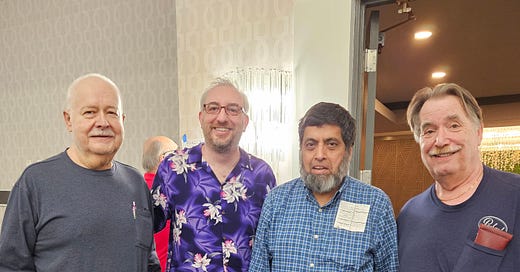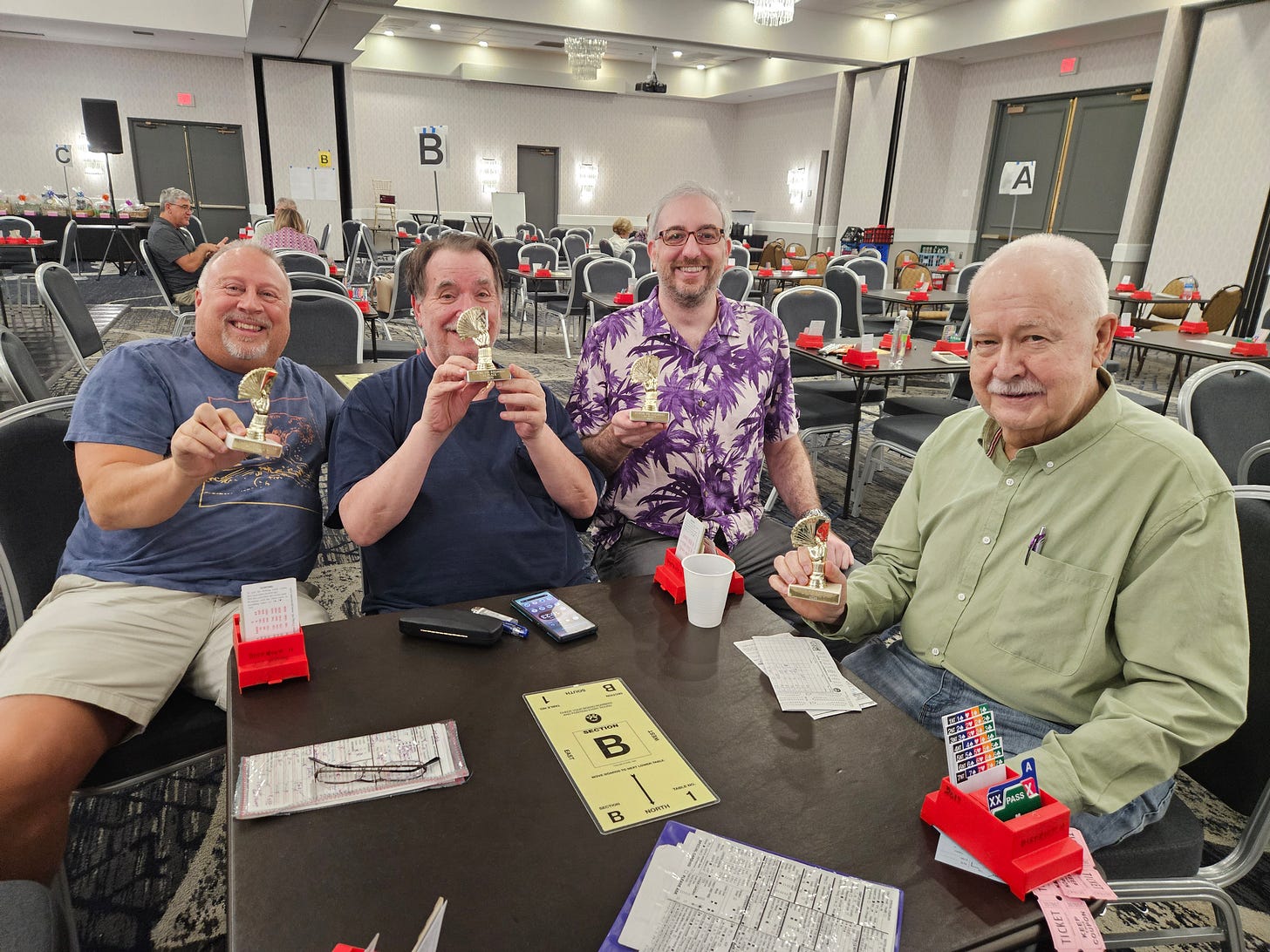I had a great week in Cincinnati. I grew up there, so it’s a homecoming for me. Lots of old friends and favorite restaurants. (I ate at Skyline Chili and Graeter’s ice cream more than I’d like to admit.)
I played with Marshall Tuly, who was one of my mentors when I was learning bridge in Cincinnati 20 years ago. In my first book, Bridge at the Cranmer Club, which tells the story of a night at the bridge club from the perspective of an up-and-coming young player, the mentor character with whom he is playing is based, very loosely, on Marshall.
Marshall and Norm Coombs were the best players in Cincinnati, and they took me under their wings and taught me about high-level bridge. I would not be where I am without them, and am eternally grateful. Norm has sadly passed away, and Marshall has basically stopped playing. He played with me a couple days in this tournament last year, and hadn’t touched a card since. So the week was especially rewarding as I got to see him really enjoying playing.
This has me reflecting on my development as a young player and thinking about mentorship. Cincinnati had a great mentor/mentee program: volunteers who were Life Masters were paired up with newer players for a year. There was a big kick-off event and a celebration game at the end of the year. During the year, mentors were encouraged to play with their mentee at least once per month. The mentors weren’t charged card fees for these games at the club.
I was a mentee my first year in town; one of the more experienced players in the club, Barb Levinson, took me on and taught me a lot. We remained partners for years afterwards. It was after seeing me come through the program and realizing I had some talent that Marshall and Norm began their unofficial mentorships.
I made Life Master that year (I started the year with 50 points!), so I was a mentor the following year. It was a great experience for me, and I learned a lot about teaching bridge.
Have any of you experienced similar formal mentoring programs, either as mentors or mentees? I think it’s a great model for introducing newer players to open games and team games in a comfortable environment. I’m sure there are lots of places doing similar things, but I wonder if it’s something that can be replicated nationwide.
Our results at the tournament were very good. We played in five Swiss/Bracketed Teams events and won three of them. Our teammates Siraj Haji and Jay Albright played great all week and ended up second and third on the masterpoint winners list. We had a couple of other folks joining the team a couple of days. I came away with 46 masterpoints; not a bad haul for a small tournament, especially considering I took a couple of days off (Marshall could only take so much time off work).
Unfortunately, the team events were pretty small. The pairs events were paying many more masterpoints to the winners (roughly 30, compared to about 14 for the teams), so most of the pros were playing there. I’m sure part of the reason they paid more was that they were bigger, but I feel like the relative masterpoint awards for team and pairs games have shifted in favor of pairs. I love matchpoints, but for me a tournament has always been about playing team games. I came of age in the era of Gatlinburg and the huge knockout events that were the loci of every regional. I still have that teams mentality: matchpoints is what you play every day at the club and on BBO; tournaments are special because they have team events.
I’d like to see these small regionals encourage everyone to play in the same event. If I had it my way, we would just hold one flighted event each day. One day teams, another pairs. Guarantee people you’ll find them teammates for the team games. Not offering both pairs and team games every day seems to be a non-starter for most tournament organizers; my solution is to designate one game each day as the featured/premier event of the day. Encourage everyone to choose this event by offering extra masterpoints, trophies, and prizes. You can offer a pairs event when the featured event is teams, and vice versa, but these would be decidedly secondary events.
I’m curious what you all think about this idea. We need to do a lot of work to make tournaments appealing, especially to newer players. That requires some outside the box thinking and a rejection of “we’ve always done it this way” thinking. That’s why I’m running for the ACBL board, to represent New York City and New England. Wish me luck!
I got a lot of great feedback about last week’s podcast with Nabil Edgtton. His Mental Edge document is amazing, and I encourage you all to check it out. I’ve been looking for new forms of meditation, and he recommended the Primed Mind app, which it turns out is the app of the company my new hypno coach works for. So I’ve been trying that.
This week’s podcast is with Adam Kaplan, who just won the Team Trials and is an old friend.
I encourage you to share your progress in the comments. We’re all in this together!!
Have a great week.






Adam. I understand too well. You saw about the George Hudson Pro-Am games at every ABA National. George grew up in St Louis and was also in GNYBA for many years (was ABA President for 2 terms before COVID hit). George died on the of atonement in 2019.
There is much to be said about that shirt. Out of respect, I won’t be saying it. The mentoring program is brilliant. I am going to pass it along.